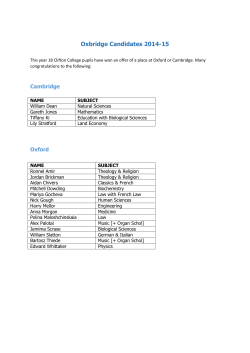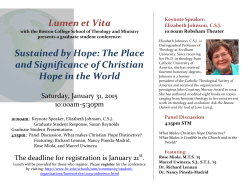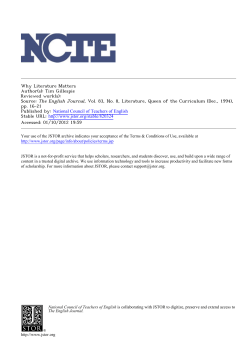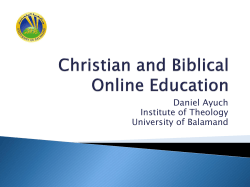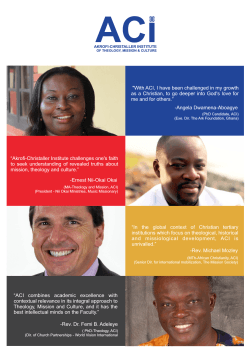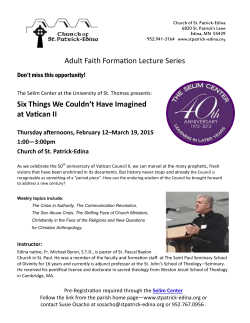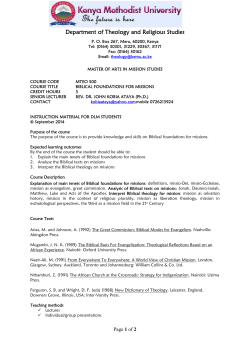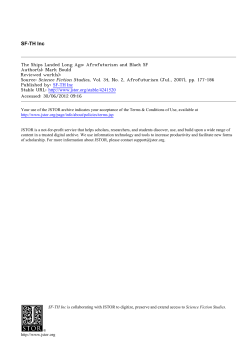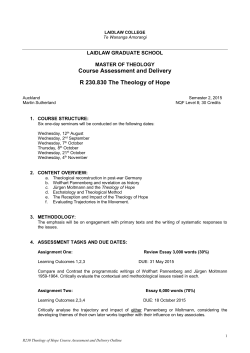
Two Sermons on Some of the Mutual Influences of Theology and the
Two Sermons on Some of the Mutual Influences of Theology and the Natural Sciences by James M. Wilson Review by: J. Ellis McTaggart International Journal of Ethics, Vol. 11, No. 1 (Oct., 1900), pp. 130-132 Published by: The University of Chicago Press Stable URL: http://www.jstor.org/stable/2376444 . Accessed: 20/12/2014 14:51 Your use of the JSTOR archive indicates your acceptance of the Terms & Conditions of Use, available at . http://www.jstor.org/page/info/about/policies/terms.jsp . JSTOR is a not-for-profit service that helps scholars, researchers, and students discover, use, and build upon a wide range of content in a trusted digital archive. We use information technology and tools to increase productivity and facilitate new forms of scholarship. For more information about JSTOR, please contact support@jstor.org. . The University of Chicago Press is collaborating with JSTOR to digitize, preserve and extend access to International Journal of Ethics. http://www.jstor.org This content downloaded from 163.1.255.60 on Sat, 20 Dec 2014 14:51:14 PM All use subject to JSTOR Terms and Conditions 130 International Journal of Ethics. Flux breaks new ground with an article on Polegraphy (Greek, This article we do most heartily welcome. to sell). It is a lucid exposition of a work entitled "Le Commerce," by M. H. Lefevre, sometime private secretary to the late Baron James de Rothschild, a work which seems to have been little read. In it, dealings in a developed market, including dealings in "futures" and "options," are diagrammatically treated with considerable success and originality. In conclusion we must express our conviction that Palgrave's Dictionary will remain a standard and indispensable work for many years to come. No economist, who is an economist in the general sense, can afford to be without it; and its service to men of business and public officials should be considerable. We marvel not that its production has occupied twelve years, but that it has not taken more. S. J. CHAPMAN. rwAeev, UNIVERSITY COLLEGE, CARDIFF. Two SERMONSON SOME OF THE MUTUAL INFLUENCESOF THEOLOGYA-ND THE NATURAL SCIENCES. By the Ven. James M. Wilson, M. A., F. G. S., Vicar of Rochdale and Archdeacon of Manchester. London: Macmillan & Co., i899. PP. 36. These sermons were preached during the visit of the British Association to Dover. Their main contention is that Theology is a science. "There is no reason, in the nature of things, why there should not some day be a section, or sub-section, of the British Association for the Advancement of Science devoted to the recording of theological research, and to registering its progress." Many of the parallels which Archdeacon Wilson draws between Theology and the natural sciences are extremely suggestive and valuable. In each case we find hypotheses, in each case we are subject to the relativity of knowledge, in each case we have no right to suppose that we have reached finality, in each case we find conclusions of every degree of certainty. But I think that the author goes too far when he ignores the fact that the methods of science and of metaphysics are very different, and that the method of theology must be that of metaphysics. "The differentia of Theology from other sciences lies, not in its scope, nor in its method, but in the fact that the necessity men seem to be under to seek for a rational explanation of themselves and of their surroundings, and to demand complete unity in this This content downloaded from 163.1.255.60 on Sat, 20 Dec 2014 14:51:14 PM All use subject to JSTOR Terms and Conditions Book Reviews. I31 explanation, drives and has always driven the philosophic theologian, as it does not drive all men, to postulate in all forms of energy, as well as in human personality, the presence and action of a Divine indwelling Spirit. Certain spheres of observation and study lend themselves more obviously than others to the suggestion and verification of this hypothesis, and it is these, therefore, which form the chief sphere of Theology." Again, we are told, that, like other sciences, Theology "is based on the observation of phenomena only." If I understand this rightly, it means that Theology works inductively. For induction is the method by which the natural sciences deal with phenomena. Now I cannot see how a Theology based on induction-even the widest possible induction-could have any claim to even the slightest probability. For those conclusions, whose truth Theology wishes to determine, are conclusions about the universe as a whole. A God who ruled part only of the universe would not be God. We have not freedom if there is any collocation of circumstances in which we could not act freely. We are not immortal if any collocation of circumstances could destroy us. Can any induction offer us the least probability on any of these subjects? To judge of all Frenchmen by the first man encountered on the Calais pier would be rash, but would it be so rash as to trust such an induction? We do not know the extent of the universe in time and space, but we do know that all our inductions are based on observations limited to an insignificant portion of that time and space. If every phenomena on this planet, or accessible to astronomy, since the birth of history, harmonized completely with the hypothesis of a beneficent Creator, what amount of help would that give us, if we kept to inductive methods, towards a conclusion that this was the best hypothesis for a universe of which all such phenomena were an insignificantly small portion? Archdeacon Wilson deprecates the claim of any Theological conclusion as finality. But such conclusions would surely be devoid of even the slightest provisional value. "It is," we are told again, "because of the immense mass of human experience which testifies that Jesus Christ has taught men, as no one else has taught them, to realize our relations to God, and gives men that ideal and hope and rest, that we are compelled to think of Him, as St. John did, as the manifestation of the Divine Life, and look to Him as the revealer of the Way of Life. Such a This content downloaded from 163.1.255.60 on Sat, 20 Dec 2014 14:51:14 PM All use subject to JSTOR Terms and Conditions I32 International Journal of Ethics. faith passes out of the region of hypothesis. In presence of this practical exactitude, derived from experience, we may well forget that, in theory, this too is but an inference from experience." But if the testimony of human experience were unanimous what, by the methods of science, could it prove? Surely no more than that Jesus was the greatest moral teacher so far within that period of the history of our planet which is covered by our historical knowledge. It could only place him in the position in which some one else-perhaps Buddha, perhaps Socrates,-was before the Sermon on the Mount. And it could give no ground to suppose that he might not be displaced to-morrow by a new teacher, as they had been displaced by him. This would scarcely be enough for Archdeacon Wilson, who, in the second sermon, speaks of the Incarnation as "unique." But what more could be reached by this path? I am not attempting to deny that Theology can start from experience and reach universal results. I believe that it can. But I submit that it must employ, not the methods of science, but such methods as those by which Kant and Hegel arrived at a truth which is both deeper and broader than the truths of science. It is with metaphysics, not science, that Theology has to reckon. This, no doubt, is to be regretted for many reasons. For Theology has a message she desires to deliver to the average man. And the average man, while he is inclined to trust the methods of science, neither trusts nor understands the methods of metaphysics--at any rate, at present. But although it is to be regretted, I do not see how it can be avoided. J. ELLIS MCTAGGART. TRINITY COLLEGE, CAMBRIDGE. IDEALISM AND THEOLOGY: Charles F. d'Arcy, B. D. PP. viii., 294. A Study of Presuppositions. By London: Hodder & Stoughton. In this book the author starts from a partial acceptance of the idealism of T. H. Green, but holding that this idealism fails to furnish a complete philosophy he seeks to show that it finds its true development or correction in a conception, which itself is found to coincide with Christian Theism. According to Green the principle of the world is a self-consciousness the nature of which is to be conceived after the analogy of the human consciousness, the human consciousness being in fact but a partial This content downloaded from 163.1.255.60 on Sat, 20 Dec 2014 14:51:14 PM All use subject to JSTOR Terms and Conditions
© Copyright 2025
